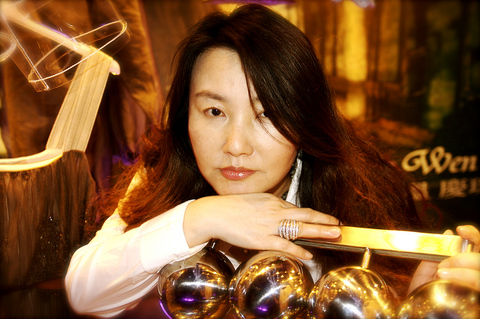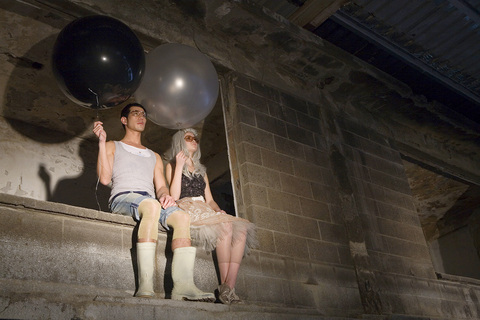The mercurial Isabelle Wen (溫慶珠) decided against a runway show this year and instead transformed her Taipei atelier into an art space to introduce her Spring/Summer collection, a futuristic slant on what-to-wear.
There were models running around, of course, but clothes were the principal focus and they hung from the ceiling in the central exhibition area, suspended in space, slowly rotating like three-dimensional works of art.
They were framed by a multi-media exhibition held over two nights. A digital art projection by Lee Ji-hong (李基宏) splashed light around the entrance of Wen's studio, while a nearby installation piece fashioned from cotton represented dreams and clouds.

PHOTO: JULES QUARTLY, TAIPEI TIMES
In a small gallery leading to the main room there were manipulated photographic images of Wen by art coordinator Nicolas Chu (周隸). In the "floating room" there was a bed with a spectacular comforter made from orange ping-pong balls, by Chen Hui-chiao (陳慧嶠).
Opposite the bed was a television beaming images from a Wen fashion shoot at the Museum of Tomorrow, on Civil Boulevard. Models with bobbed, neon blue hair wore brushed-silver midi coats, pop art mini dresses and golden Formula 1 driving shoes.
The overall impression was of neat, clean-cut designs with an emphasis on metallic colors. It was a more minimalist approach than in the past and the garments appeared to be easier to wear.

PHOTOS COURTESY OF ISABELLE WEN
A transparent raincoat caught the eye, with its white belt buckle and a crystal-embossed angel design on the back. As did the mini-jacket with a silver snake pattern and matching bag. The concept appeared to be, "Barbarella hits the night market for her space outfit."
"I called the collection Mercury, after the planet and the [element]," Wen said at the opening last week. "Usually I am inspired by a dream or something to produce a collection, but this time the clothes came first and the name came after."
"I ordered the fabric and had all the ideas about 10 months ago, but then something horrible happened and I just wanted some light, something shiny in my life, so that was why I came up with the concept."

The "horrible" event Wen referred to was the crash of Idee department store four months ago, when Rebar Group Chairman Wang You-theng (王又曾) fled the country with other people's billions. Wen had four outlets in the store and said she lost NT$20 million.
"We have sued them already but we can't get our money back because it belongs to the bank. The company of Isabelle, the fashion brand, has almost gone back to the first year because of this.
"Wang You-tseng, I think he's horrible, he's destroyed Taiwan. Actually, I'm super good friends with his daughter [Idee chairwoman Wang Lin-mei (王令楣)] and a couple of weeks after it happened we had dinner together. You know, even after three hours, I couldn't say a thing. What could she do?
"I couldn't even pay the New Year bonus. I tell you it was so bad, so many small companies went down because of this. I cried for weeks."
At around the same time management at Taipei 101 decided she could not renew her store's contract. Wen was livid and trashed her store the night after it closed.
"This was their policy, they didn't want Taiwan brands on the second floor, they made it very clear. It almost made me want to give up Taiwan. I can't understand their thinking."
It was these "huge losses" that led to the decision not to hold a traditional fashion show and ultimately rethink her business.
"Actually I did not want to do anything and I could not afford to do the runway presentation, so the fashion-as-art exhibition was a response to these terrible things."
But adversity is the mother of invention and Wen has risen to the challenge before. Her new collection is strong and she has employed an operation director, Sandrine Boscaro Compain, to take her brand to the next level, especially abroad.
The French-Italian business school graduate said she was consolidating operations and developing sales and marketing strategies.
"I have no logic, I need someone to do this for me," Wen said.
"She should not be running the business all on her own," Compain agreed. "She needs someone else to concentrate on this, she is an artist, a visionary."
But whether she stays in Taiwan is another question. She said the country was "totally crashing" and was obviously feeling bruised by the financial crisis at Idee and the attitude of Taipei 101's managers.
It appeared she wanted to escape her problems here, as much as succeed elsewhere.
"Maybe my ideas are not totally suitable for Taiwanese and if I go elsewhere then they will appreciate me more. Perhaps this is the way," Wen said.
"I have no doubts she should go abroad, but first you have to manage growth and now we are preparing for this. We must structure the company properly to make it international," Compain said.
As for whether the direction would be east or west, this seemed to be moot. Wen mentioned Shanghai and Beijing, but Compain said Europe and America appreciated Asian designers more.
Either way, Wen is moving forward. As she says, "fashion is art for the future" and what she designs today is what we will be wearing tomorrow.

April 14 to April 20 In March 1947, Sising Katadrepan urged the government to drop the “high mountain people” (高山族) designation for Indigenous Taiwanese and refer to them as “Taiwan people” (台灣族). He considered the term derogatory, arguing that it made them sound like animals. The Taiwan Provincial Government agreed to stop using the term, stating that Indigenous Taiwanese suffered all sorts of discrimination and oppression under the Japanese and were forced to live in the mountains as outsiders to society. Now, under the new regime, they would be seen as equals, thus they should be henceforth

Last week, the the National Immigration Agency (NIA) told the legislature that more than 10,000 naturalized Taiwanese citizens from the People’s Republic of China (PRC) risked having their citizenship revoked if they failed to provide proof that they had renounced their Chinese household registration within the next three months. Renunciation is required under the Act Governing Relations Between the People of the Taiwan Area and the Mainland Area (臺灣地區與大陸地區人民關係條例), as amended in 2004, though it was only a legal requirement after 2000. Prior to that, it had been only an administrative requirement since the Nationality Act (國籍法) was established in

With over 80 works on display, this is Louise Bourgeois’ first solo show in Taiwan. Visitors are invited to traverse her world of love and hate, vengeance and acceptance, trauma and reconciliation. Dominating the entrance, the nine-foot-tall Crouching Spider (2003) greets visitors. The creature looms behind the glass facade, symbolic protector and gatekeeper to the intimate journey ahead. Bourgeois, best known for her giant spider sculptures, is one of the most influential artist of the twentieth century. Blending vulnerability and defiance through themes of sexuality, trauma and identity, her work reshaped the landscape of contemporary art with fearless honesty. “People are influenced by

The remains of this Japanese-era trail designed to protect the camphor industry make for a scenic day-hike, a fascinating overnight hike or a challenging multi-day adventure Maolin District (茂林) in Kaohsiung is well known for beautiful roadside scenery, waterfalls, the annual butterfly migration and indigenous culture. A lesser known but worthwhile destination here lies along the very top of the valley: the Liugui Security Path (六龜警備道). This relic of the Japanese era once isolated the Maolin valley from the outside world but now serves to draw tourists in. The path originally ran for about 50km, but not all of this trail is still easily walkable. The nicest section for a simple day hike is the heavily trafficked southern section above Maolin and Wanshan (萬山) villages. Remains of